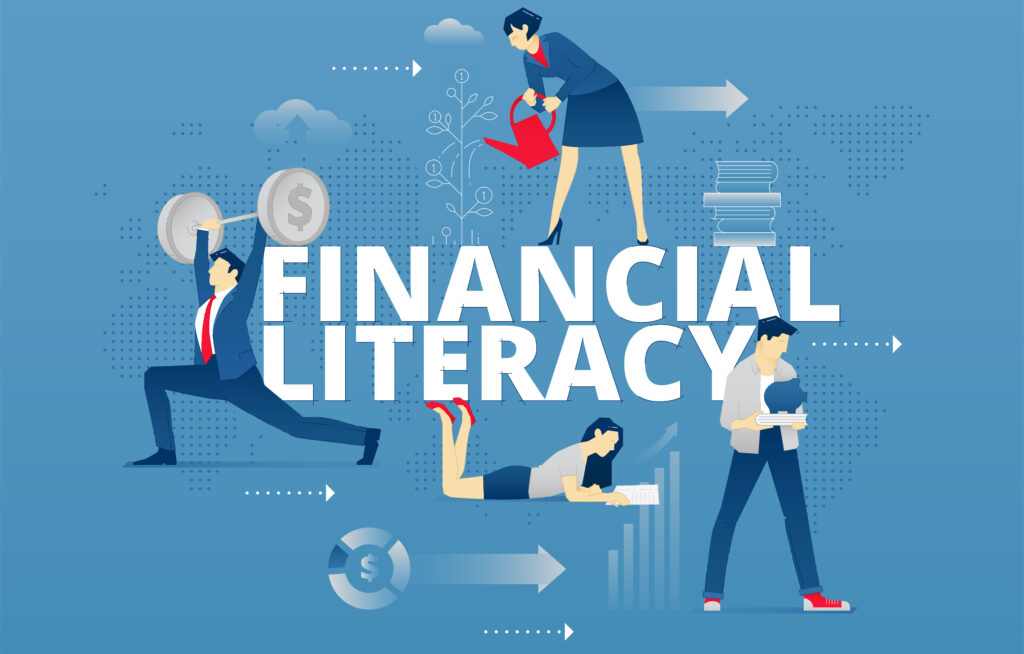
Table of Contents
Financial literacy is not just about understanding money—it’s about making informed decisions that can improve your financial well-being and stability. Here’s a more comprehensive look at essential concepts everyone should grasp.
Understanding Financial Literacy
Budgeting is a critical skill for managing personal finances effectively. Start by tracking your spending to understand where your money goes each month. Categorize your expenses into needs (essential items like housing and food) and wants (non-essential items like entertainment). Use budgeting tools or apps to simplify the process. The 50/30/20 rule is a popular guideline: allocate 50% of your income to needs, 30% to wants, and 20% to savings and debt repayment. Regularly reviewing and adjusting your budget helps you stay on top of your finances and avoid overspending.
The Importance of Saving
Saving money goes beyond just setting aside cash. Establishing a budget helps you determine how much you can save regularly. Use high-yield savings accounts or certificates of deposit (CDs) for your emergency fund to earn better interest. For longer-term goals, consider investing in retirement accounts or mutual funds. Automate savings by setting up direct deposits into your savings account or investment vehicles. Building a habit of saving consistently, even in small amounts, can lead to significant financial benefits over time.
Understanding Debt
Debt management is a crucial part of maintaining financial health. Different types of debt have varying implications. Credit card debt often comes with high-interest rates and can quickly accumulate if not managed carefully. Student loans may offer lower interest rates and flexible repayment options, but they can impact your financial future if not addressed early. Mortgages involve long-term commitments, so understanding terms and interest rates is vital. Keep track of your credit score, as it affects your ability to secure loans and the interest rates you’ll pay. Using tools like debt snowball or avalanche methods can help you pay off debt more efficiently.
Investing for the Future
Investing allows you to grow your wealth through various asset classes. Begin with understanding the basics of stocks, bonds, mutual funds, and real estate. Stocks represent ownership in a company and can offer high returns but come with higher risk. Bonds are loans to companies or governments that provide regular interest payments with lower risk compared to stocks. Mutual funds pool money from multiple investors to invest in a diversified portfolio. Real estate involves purchasing property for rental income or capital appreciation. Diversify your investments to balance risk and reward. Consider retirement accounts like 401(k)s or IRAs for long-term investments, and regularly review your investment strategy to align with your financial goals.
Retirement Planning
Retirement planning involves more than just saving money; it’s about creating a strategy to ensure you have sufficient funds to live comfortably when you retire. Start by estimating your future expenses and determining how much you need to save to meet those needs. Take advantage of employer-sponsored retirement plans, such as 401(k)s, which may offer matching contributions. Explore Individual Retirement Accounts (IRAs) for additional tax-advantaged savings. Factor in Social Security benefits, pensions, and other sources of retirement income. Regularly review your retirement plan to adjust for changes in income, expenses, or financial goals.
Understanding Taxes
Taxes impact nearly every financial decision you make. Learn how different types of income are taxed, including ordinary income, capital gains, and dividends. Familiarize yourself with tax deductions and credits that can reduce your taxable income, such as those for mortgage interest, student loan interest, and charitable contributions. Consider tax-advantaged accounts like Health Savings Accounts (HSAs) or Flexible Spending Accounts (FSAs) for additional tax benefits. Stay updated on changes to tax laws and consult with a tax advisor to optimize your tax strategy.
Protecting Your Financial Well-being
Insurance is an essential component of financial planning. Health insurance helps cover medical expenses and protect against high healthcare costs. Auto insurance is required for vehicle ownership and can provide coverage for accidents and damages. Homeowners or renters insurance protects against loss or damage to property. Life insurance provides financial support to your beneficiaries in the event of your death. Regularly review your insurance policies to ensure adequate coverage and adjust as needed.
Setting Financial Goals
Setting clear, achievable financial goals helps you stay focused and motivated. Start by identifying short-term goals (e.g., saving for a vacation), medium-term goals (e.g., buying a car), and long-term goals (e.g., retirement planning). Use SMART criteria—Specific, Measurable, Achievable, Relevant, and Time-bound—to define and track your goals. Break larger goals into smaller, manageable steps and celebrate milestones along the way. Regularly assess your progress and make adjustments to your plan as needed.
Educating Yourself Continually
Financial literacy is an ongoing journey. Stay informed about financial trends, investment opportunities, and changes in financial regulations. Read books, attend seminars, and follow reputable financial news sources. Online courses and workshops can also provide valuable insights into personal finance and investment strategies. Continuously updating your knowledge helps you make informed decisions and adapt to new financial challenges.
Conclusion
Financial literacy is an essential skill that empowers individuals to make informed decisions about managing their money. By mastering the basics of budgeting, saving, debt management, investing, retirement planning, taxes, insurance, goal setting, and continuous education, you lay the groundwork for a stable and prosperous financial future. Understanding these core principles enables you to navigate financial challenges with confidence, optimize your resources, and achieve both short-term and long-term goals. Remember, financial literacy is a lifelong journey. Continuously educating yourself and adapting your strategies as circumstances change will help you stay on track and make the most of your financial opportunities. Embrace these fundamentals, and you’ll be well-equipped to build a secure and fulfilling financial future.
